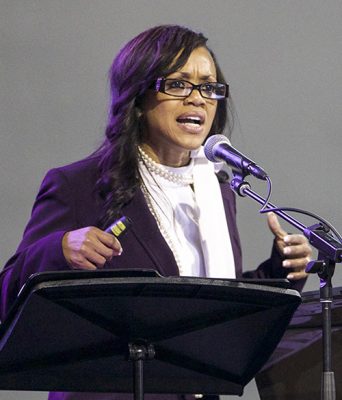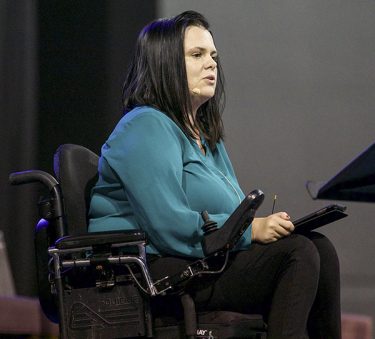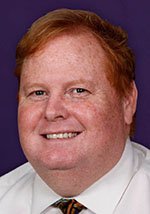By Jeannette Cruz
GCU News Bureau
An author, a reading teacher and college deans at Grand Canyon University all shared the same stage at Monday at Grand Canyon University Arena to carry on a meaningful conversation about the realms of faith and science.

Dr. Antoinette Farmer-Thompson, Vice President of Institutional Effectiveness, delivered the first presentation at the conference, on maintaining the value of Christianity while conducting scientific research.
“How do you create and cultivate Christian research when there are so many questions, complexities and a lot of controversy in the world of bioethics?” she asked the audience. “How does one distinguish Christian research from that of others?”
While it appears that we live in a society where many Christian people are unsure and fearful of where bioethics fits both in the past and present, Farmer-Thompson pointed to various ways that GCU has supported purpose-driven student research.
As an example, she pointed to a group of electrical engineering students who created an electrical wheelchair for a toddler who had cognitive-development challenges.
“This is how we’re bringing Christian research into the classroom and making a difference,” she said.
Farmer also recognized several on-campus research groups – the Doctoral Community Network and the Center for Innovation in Research and Teaching – for their research. She then cited prominent Christian researchers she hoped the audience could learn from, including Joseph Murray, a Christian researcher who performed the first successful human kidney transplant on identical twins.
Ultimately, Farmer-Thompson emphasized that Christians can and should be engaged in science. She urged that, as believers, researchers must have a commitment to maximize the potential benefits of research while minimizing harm.
“It is recommended that we focus on three things,” she added. “Respect for persons, respect for justice and respect for beneficence.”

Next up, Katie Dickey, a former Teach for America educator who was born with distal spinal muscular atrophy, shared her testimony of living with a disability, being a teacher and serving globally.
During her presentation, titled “Ten Perks of Being in a Wheelchair,” Dickey, described how the genetic disease (a product of a recessive trait shared by both of her healthy parents) impacted her family. Dickey is one of three children, and because they were all born with the disease, they have shared the struggle of their personal journeys. An experience that has brought her closer to family, said Dickey.
Having faced many challenges, Dickey said she has learned many valuable lessons.
She spoke about being able to see the absolute best in others: “Sometimes homeless people ask me if I need anything.”
And seeing the best in herself: “I’ve learned how to fall gracefully and get back up, literally and figuratively. My disability has taught me perseverance.”
Alan Shlemon, author and speaker for Stand to Reason, addressed controversial issues of our time, including abortion, evolution and homosexuality.

Dr. Sherman Elliott, Dean of GCU’s College of Humanities and Social Sciences, spoke about increasing active civic engagement to discuss ethical dilemmas in artificial intelligence.
Elliott highlighted how cloning took a meaning many years ago, when, for the first time, a sheep (named Dolly) was cloned from the udder cell of an adult sheep born six years earlier.
He added, “Scientists are rapidly working on the ability to clone us, and the question is, ‘How does that shape the dignity of the human person?’”
“Our civic engagement can help us decide … we, the people, have common ground in which to figure out solutions to these dilemmas. … What a way to be empowered right now.”
Contact Jeannette Cruz at (602) 639-6631 or [email protected]



































































